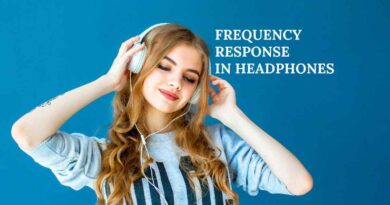Is It Safe To Sleep With AirPods?
The use of personal audio devices for sleep has grown in popularity. Apple’s AirPods, with their comfortable design and seamless integration, are a tempting option for those seeking auditory assistance while drifting off. However, concerns exist regarding the safety and efficacy of sleeping with AirPods.
This analysis will explore the potential risks associated with this practice, including sleep disruption, hearing health, and hygiene, while also examining the effectiveness of AirPods in promoting sleep. By weighing these factors, we can determine if AirPods are a suitable sleep companion.
Safe To Sleep With AirPods or Earphones? What Studies Say?
Doctors generally recommend against sleeping with headphones, including AirPods. While there isn’t extensive research on the specific risks of AirPods during sleep, studies on in-ear headphones raise concerning issues. Earphones, by their very nature, can trap moisture and create a warm, humid environment in your ear canal. This can be a breeding ground for bacteria, increasing the risk of ear infections.
Beyond infection, loud music listening, a common practice for those trying to block out noise while falling asleep, can damage your hearing over time. A study published in the Journal of the American Academy of Audiology suggests a connection between loud music exposure and hearing loss, especially for extended durations. This is particularly concerning since you might not be aware of how loud your music is while drifting off to sleep.
While using AirPods to fall asleep to calming music might seem like a simple solution, the potential downsides for your ear health and sleep quality are significant. Safer alternatives exist for creating a relaxing sleep environment. Consider using white noise machines that produce constant, ambient sounds or explore earplugs specifically designed for comfortable sleep. These options can effectively block out unwanted noise without the risks associated with headphones. So what are the dangers of sleeping with AirPods? Read to learn more.
30 Potential Risks of Sleeping With AirPods
-
Risk of ear discomfort
Sleeping with AirPods can lead to discomfort in your ears due to prolonged pressure on the ear canal. This discomfort may range from mild irritation to more severe pain, disrupting your sleep quality and causing discomfort throughout the day.
-
Potential for ear infections
Extended use of AirPods, especially while sleeping, can create a warm and moist environment inside your ears, which is conducive to bacterial growth. This increases the risk of developing ear infections such as otitis externa (swimmer’s ear) or otitis media (middle ear infection).
-
Risk of earwax buildup
Wearing AirPods for extended periods, including during sleep, can obstruct the natural flow of earwax out of the ear canal. This may lead to excessive earwax buildup, potentially causing discomfort, hearing loss, or even ear infections if left untreated.
-
Disruption of sleep patterns
Listening to music or podcasts with AirPods while sleeping may disrupt your natural sleep patterns. The stimulation from audio can prevent you from reaching deeper stages of sleep, resulting in poor sleep quality and daytime fatigue.
-
Increased risk of accidents
Sleeping with AirPods increases the risk of accidental damage to the devices or to yourself. Rolling over onto the AirPods or entangling them in bedding can cause them to fall out, potentially leading to breakage or injury.
-
Interference with sleep partners
If you share a bed with a partner, sleeping with AirPods may disturb their sleep as well. The sound leakage from the AirPods or the movement caused by adjusting them during sleep can disrupt your partner’s rest, leading to tension or resentment over time.
-
Risk of electromagnetic radiation exposure
Some studies suggest that prolonged exposure to electromagnetic radiation emitted by wireless devices like AirPods may have potential health risks, although conclusive evidence is still lacking. Sleeping with AirPods could increase your overall exposure to such radiation.
-
Impact on AirPods battery life
Frequent use of AirPods, including during sleep, can accelerate the depletion of their battery life. Constant charging and discharging cycles may shorten the overall lifespan of the AirPods, requiring more frequent replacements or repairs.
-
Potential for device malfunction
Sleeping with AirPods increases the likelihood of accidental damage or malfunction due to factors such as pressure, moisture, or physical stress. This could result in issues such as audio distortion, connectivity problems, or complete device failure.
-
Risk of allergic reactions
Some individuals may develop allergic reactions to the materials used in AirPods, such as silicone or nickel. Prolonged contact with these materials, especially during sleep when skin sensitivity may be heightened, could lead to skin irritation, itching, or rash.
-
Reduced awareness of surroundings
Wearing AirPods while sleeping can diminish your awareness of your surroundings, making you less responsive to potential dangers or emergencies during the night. This could pose risks in situations such as fire alarms, intruders, or medical emergencies.
-
Potential for discomfort from earbud pressure
The pressure exerted by AirPods’ earbuds against the ears may cause discomfort or soreness, particularly if you’re lying in the same position for an extended period while sleeping. This discomfort can affect your ability to fall asleep or stay asleep comfortably.
-
Risk of accidental swallowing
Sleeping with AirPods increases the likelihood of accidentally swallowing or inhaling the devices, particularly if they become dislodged during sleep. This poses a choking hazard, especially for children or individuals with impaired consciousness.
-
Impact on sleep hygiene
Using AirPods while sleeping can disrupt your sleep hygiene by associating bedtime with stimulation rather than relaxation. This may make it harder for you to wind down and fall asleep naturally, leading to prolonged insomnia or difficulty establishing a regular sleep schedule.
-
Potential for skin irritation
Extended contact with AirPods’ surfaces, particularly if they’re not cleaned regularly, can cause skin irritation or allergic reactions. Sweat, oils, or dirt accumulated on the devices may exacerbate existing skin conditions or trigger new ones, such as dermatitis or acne.
-
Risk of accidental ingestion by pets
Pets may be attracted to AirPods left unattended while sleeping, mistaking them for toys or treats. Accidental ingestion of AirPods by pets can result in choking, digestive obstructions, or internal injuries, necessitating urgent veterinary care.
-
Negative impact on hearing health
Continuous exposure to high volumes through AirPods, especially while sleeping, can contribute to hearing loss or auditory damage over time. Prolonged use at elevated volumes may lead to permanent hearing impairment or tinnitus (ringing in the ears).
-
Disruption of circadian rhythms
Listening to stimulating audio content with AirPods before sleep can disrupt your circadian rhythms, making it harder for your body to transition into a restful state. This can delay the onset of sleep and affect the overall quality of your restorative rest.
-
Risk of dependency on audio stimulation
Relying on AirPods to fall asleep may create a dependency on external audio stimulation, making it challenging to sleep without them. This psychological dependence can contribute to insomnia or anxiety related to sleep disturbances.
-
Impact on intimacy in relationships
Sleeping with AirPods may hinder intimacy in romantic relationships by creating a barrier between partners during shared bedtime routines. The presence of earphones can detract from physical closeness or communication, potentially straining relationship dynamics.
-
Potential for aggravating existing ear conditions
Individuals with pre-existing ear conditions, such as tinnitus or Meniere’s disease, may experience worsened symptoms from sleeping with AirPods. The added pressure, stimulation, or exposure to sound can exacerbate discomfort or imbalance associated with these conditions.
-
Risk of device overheating
Extended use of AirPods, particularly while sleeping, can cause the devices to overheat, posing a risk of burns or fire hazards. Blocked ventilation or prolonged contact with bedding materials may contribute to overheating issues.
-
Impact on sleep efficiency
Listening to audio content with AirPods while sleeping may reduce the overall efficiency of your sleep, as your brain remains partially engaged with external stimuli rather than entering a fully restorative sleep state. This can result in fragmented sleep patterns and decreased daytime alertness.
-
Potential for social isolation
Frequent use of AirPods, including during sleep, may contribute to feelings of social isolation or disconnection from others. Choosing to immerse yourself in audio content rather than engaging with family members or roommates during shared downtime can strain interpersonal relationships.
-
Risk of positional discomfort
The presence of AirPods in your ears while sleeping may exacerbate positional discomfort, particularly if you tend to shift positions frequently during the night. This can lead to pressure points, soreness, or stiffness in the neck, shoulders, or jaw upon waking.
-
Impact on melatonin production
Exposure to artificial light and stimulating audio through AirPods before sleep can suppress the production of melatonin, the hormone that regulates your sleep-wake cycle. Reduced melatonin levels may delay the onset of sleep and disrupt your overall sleep quality.
-
Potential for psychological dependency
Relying on AirPods as a sleep aid may foster psychological dependency on external stimuli for relaxation or sleep induction. This dependency can perpetuate sleep difficulties and hinder the development of healthy sleep habits over time.
-
Risk of damage to ear canals
The pressure exerted by AirPods’ earbuds against the ear canals during sleep may lead to physical trauma or micro-injuries over time. This can cause inflammation, sensitivity, or structural damage to the delicate tissues of the ear canal.
-
Impact on environmental awareness
Wearing AirPods while sleeping reduces your awareness of environmental cues, such as alarms, sirens, or approaching footsteps. Diminished environmental awareness can compromise your safety and responsiveness to potential threats or emergencies during the night.
-
Potential for addiction to audio content
Continuous exposure to audio content through AirPods, especially during sleep, may contribute to addiction-like behaviors related to seeking out and consuming stimulating stimuli. This can lead to compulsive usage patterns and difficulty disengaging from audio entertainment when necessary.
Are There Any Benefits Of Sleeping With AirPods Or Earphones?
Sleeping with AirPods can offer some benefits, especially if you struggle with noise interference. Their active noise cancellation can block out disruptive sounds like traffic or a snoring partner. AirPods can also be helpful for falling asleep if you listen to calming music or white noise. This can create a relaxing atmosphere and lull you into sleep. However, it’s important to be aware of potential drawbacks like discomfort while lying on your side and earbud budging or falling out. Below are a few alternatives you can try.
Alternatives To Wearing AirPods While Sleeping
Airpods are not ideal for sleeping due to several reasons. They can be uncomfortable, especially for side sleepers, and can fall out during the night. They also block out some sound, which can be important for safety reasons. Here are some alternative options to consider:
Earplugs: Earplugs are a classic option for blocking out noise while sleeping. They come in a variety of materials, including foam, silicone, and wax. Foam earplugs are the most common type and are very effective at blocking out noise. Silicone earplugs are more comfortable to wear for long periods of time, and wax earplugs are a good option for people with sensitive ears.
White noise machine: A white noise machine can generate a constant, soothing sound that can help to mask other noises and promote sleep. White noise machines can be especially helpful for people who live in noisy environments or who have trouble falling asleep because of tinnitus.
Sleep mask: A sleep mask can block out light, which can help to improve sleep quality. Sleep masks can also be helpful for people who travel or who have trouble sleeping in a bright room.
Headband headphones: Headband headphones are a type of headphone that is designed to be worn around the head. They are a good option for people who find earplugs uncomfortable or who don’t like the feeling of something in their ears. Headband headphones come in a variety of styles, including those with built-in speakers and those that connect to a device with a cable. There are also special headband headphones designed for sleeping, which are often made from soft, comfortable materials.
Earmuffs: Earmuffs are similar to earplugs, but they block out sound by covering the entire ear. Earmuffs are a good option for people who need to block out a lot of noise, such as construction noise or traffic noise.
Conclusion
While there isn’t a huge safety hazard from occasionally sleeping with AirPods, the potential downsides outweigh the benefits. Ear infections, discomfort, lost AirPods, and blocked-out sounds are all drawbacks to consider. For a good night’s sleep, it’s best to ditch the AirPods altogether and opt for a quiet, distraction-free environment. Your ears and your peace of mind will thank you for it!
Frequently Asked Questions
Could AirPods fall out and get lost in my sleep?
Absolutely. AirPods are not designed to stay securely in place during a lot of movement, so they could easily dislodge and get lost in the bedding.
Is the Bluetooth radiation from AirPods safe while sleeping?
Bluetooth emits very low levels of radiation, and even less so when not actively connected to a device. There’s no evidence of any health risks from Bluetooth radiation.
Could I damage my AirPods by sleeping on them?
Unless you sleep on a particularly hard surface or apply a lot of pressure, AirPods are unlikely to be damaged from being accidentally slept on.
Is there anything else to consider when sleeping with AirPods?
Yes, AirPods can block out important sounds you might need to hear during the night, like a smoke alarm or someone calling your name. Also, listening to anything at loud volumes for extended periods, even while sleeping, can damage your hearing.




